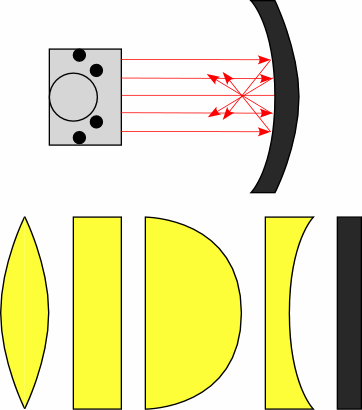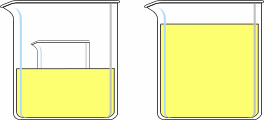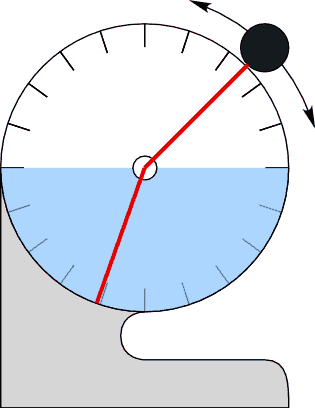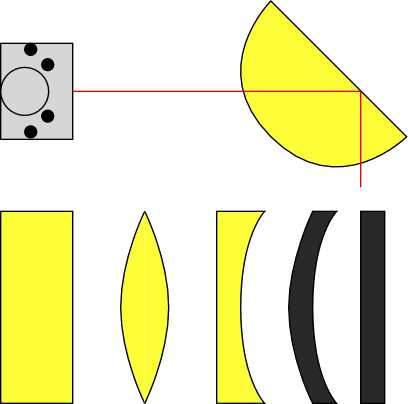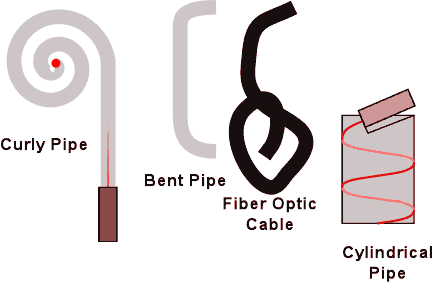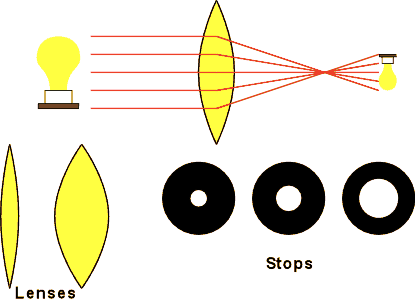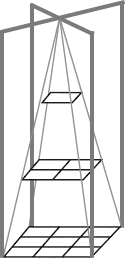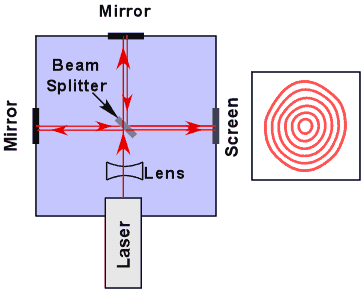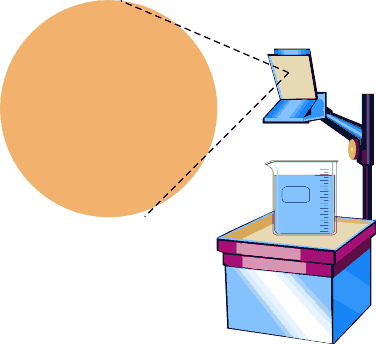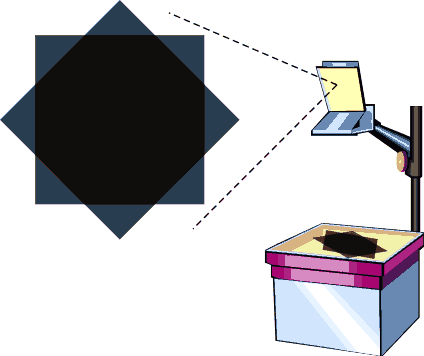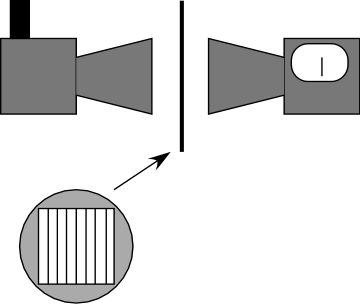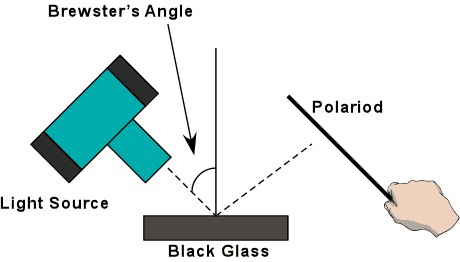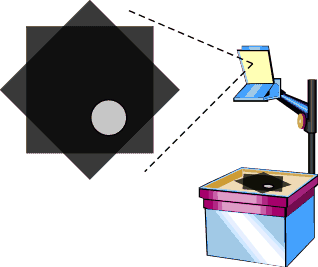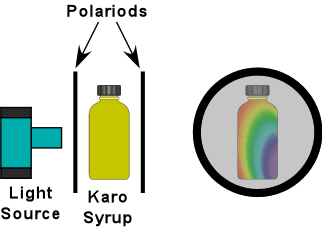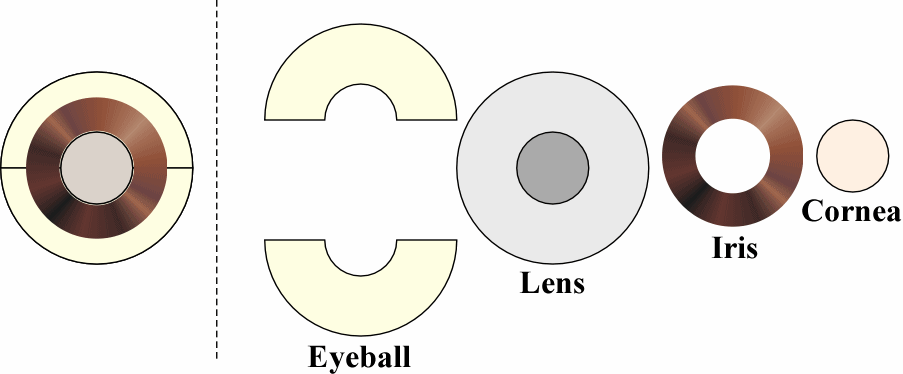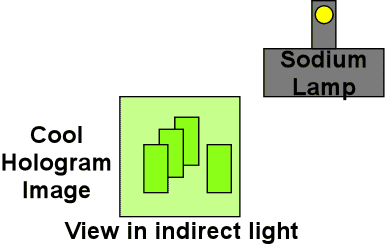Optics
|
6A20.10 |
GEOMETRIC OPTICS |
|
|
Reflection from Curved Surfaces |
||
Concave and Convex Mirrors |
||
|
|
||
|
Shine parallel beams at convex and concave mirrors. |
||
|
6A40.30 |
GEOMETRIC OPTICS |
|
|
Refractive Index |
||
Disappearing Beaker |
||
|
|
||
|
Use Johnson's baby oil or Wesson oil to make a small beaker disappear when immersed. If the beaker has graduations or words they will appear to be floating in the liquid. |
||
|
6A42.20 |
GEOMETRIC OPTICS |
|
|
Refraction at Flat Surfaces |
||
Big Plastic Refraction Tank |
||
|
|
||
|
The light source can be rotated through 270 degrees to show refraction and total internal reflection for both air/plastic and plastic/air interfaces. |
||
|
6A44.10 |
GEOMETRIC OPTICS |
|
|
Total Internal Reflection |
||
Blackboard Optics |
||
|
|
||
|
Rotate the semicircular slab of Plexiglas with the light ray entering the exiting through the curved surface. Rotate the semicircular slab until the critical angle is reached and total internal reflection is obtained. |
||
|
6A44.40 |
GEOMETRIC OPTICS |
|
|
Total Internal Reflection |
||
Laser and Fiber Optics |
||
|
|
||
|
You are provided with a Plexiglas rod, Plexiglas curly Q and a section of fiber optic cable. Hold their ends in the beam near the laser. Vary the number of reflections in the rod by changing the angle. |
||
|
6A60.30 |
GEOMETRIC OPTICS |
|
|
Thin Lenses |
||
Projected Filament w/Lens |
||
|
|
||
|
Turn on the light bulb. Move the light bulb to focus the image on the side wall. The focal lengths are marked on the lenses. Show the effect of aperture size on the sharpness on the focus by placing different sized stops in front of the lens. |
||
|
6B10.15 |
PHOTOMETRY |
|
|
Luminosity |
||
Inverse Square Model |
||
|
|
||
|
Place pointed end next to a light source. As the light crosses the first plane, we see a square area that is equal to one unit of light. At the next level we notice that the same amount of light now covers four times the area. Therefore, it is 1/4 as bright per unit area as the first level. At the bottom level, we notice it covers nine times the area or it is 1/9 as bright. |
||
|
6C10.10 |
DIFFRACTION |
|
|
Diffraction Through One Slit |
||
Single Slit and Laser |
||
|
|
||
|
Turn on the laser. The pattern appears on the wall. The slit widths are printed on the slide. To select a different slit, slide the holder sideways. We also have the Cornell slitfilm card, which includes a slit of gradually increasing width. |
||
|
6D10.10 |
INTERFERENCE |
|
|
Interference From Two Sources |
||
Double Slits and Laser |
||
|
|
||
|
Turn on the laser. The pattern appears on the wall. The slit widths and spacings are printed on the slide. To select different slits, slide the holder sideways. We also have the Cornell slitfilm card, which includes double slits of increasing width and spacing. |
||
|
6D20.10 |
INTERFERENCE |
|
|
Gratings |
||
Number of Slits |
||
|
|
||
|
|
Turn on the laser and place the slit slide in front of the beam so the beam hits one of the many slits on the slide. View the results of the interference pattern on the wall. The lights in the room may need to be darkened. |
|
|
6D30.10 |
INTERFERENCE |
|
|
Thin Films |
||
Newton's Rings |
||
|
|
||
|
Turn on the light. The interference pattern is projected onto the side wall. Change the pattern by tightening a screw on the edge of the glass disk. |
||
|
6D30.20 |
INTERFERENCE |
|
|
Thin Films |
||
Soap Film Interference |
||
|
|
||
|
Turn on the light. Dip the wire frame into the soap solution and secure with the clip. Adjust the angle until the pattern appears on the side wall. |
||
|
6D40.10 |
INTERFERENCE |
|
|
Interferometers |
||
Michelson Interferometer |
||
|
|
||
|
Turn on the laser. Read the initial position of the micrometer. Count the number of fringes while turning the micrometer slowly in one direction only. Read the final position. This can also be done with white light. |
||
|
6F40.10 |
COLOR |
|
|
Scattering |
||
Sunset |
||
|
|
||
|
A beam of light shines through a tank of water and onto the side wall. Add a capful of solution (cedarwood oil in alcohol or Lysol) to the water and stir with the stick. The "sun" will begin to turn orange. To increase the scattering, add more solution. |
||
|
6H10.10 |
POLARIZATION |
|
|
Dichroic Polarization |
||
Polaroids on the Overhead |
||
|
|
||
|
You get two sheets of Polaroid and a pair of Polaroid sunglasses. Rotate one on the Polaroids or the sunglasses. |
||
|
6H10.20 |
POLARIZATION |
|
|
Dichroic Polarization |
||
Microwave Polarization |
||
|
|
||
|
Hold a grid of parallel wires in a microwave beam and rotate the grid. |
||
|
6H20.10 |
POLARIZATION |
|
|
Polarization by Reflection |
||
Brewster's Angle |
||
|
|
||
|
Light is reflected from a sheet of black glass onto the wall. Rotate a sheet of Polaroid in the path of the reflected light. We set the light at Brewster's Angle. Vary the incident angle by rotating the light. A metal triangle can be used to set the incident light back to Brewster's Angle. |
||
|
6H30.10 |
POLARIZATION |
|
|
Circular Polarization |
||
Three Polaroids |
||
|
|
||
|
Three sheets of Polaroid are provided with an overhead projector. |
||
|
6H30.40 |
POLARIZATION |
|
|
Circular Polarization |
||
Karo Syrup |
||
|
|
||
|
Place the Karo syrup between the disks. Place the light source behind the rear polarizer disk and turn the lamp on. Rotate the front disk and watch the syrup change colors. |
||
|
6Q10.10 |
MODERN OPTICS |
|
|
Holography |
||
Holograms |
||
|
|
||
|
Turn on the light. Rotate the cylinder or walk by the hologram. A woman throws a kiss and winks at you. |
||
